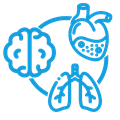
Module 1
Short- and long-term public health interventions to promote refugee and migrant health

Tool 2: Noncommunicable diseases and mental health
Tool overview
Noncommunicable diseases (NCDs) have a major impact on health and well-being and are responsible for around 74% of global deaths every year. These diseases and the major risk factors that contribute to them (tobacco use, physical inactivity, the harmful use of alcohol and unhealthy diets) also have significant negative consequences on economic productivity and financial stability for individuals and households. There are a number of risks associated with population movements that increase vulnerability to NCDs: mental health conditions, psychosocial disorders, harmful use of drugs and alcohol, nutrition disorders and exposure to violence. Although COVID-19 has affected both the rich and the poor, its impact on poorer people has been more severe. The poorest and most vulnerable members of society have the highest risk of serious illness and death from COVID-19 and its intersection with other health conditions, especially NCDs and mental health. This underscores the need to invest in NCD and mental health prevention and to protect those whose health is most vulnerable. This includes refugees and migrants.
This tool contains sections on NCDs, mental health and substance abuse impacting refugees and migrants, including context and checklist of questions relevant to NCDs and mental health. Essential messages/considerations are outlined; along with the table of resources containing guidance, training and tools or toolkits.
NCDs
NCDs, including heart disease, stroke, cancer, diabetes and chronic respiratory disease, are collectively responsible for almost 70% of all deaths worldwide with the greatest number of premature deaths from NCDs (some 85% of the total) occurring in low- and middle-income countries, which include some of the poorest nations in the world (Global health estimates). Many of these countries host high number of refuges and migrants. The rise of NCDs has been driven primarily by four major risk factors: tobacco use, physical inactivity, the harmful use of alcohol and unhealthy diets. Throughout the migration and displacement process, refugees and migrants face conditions that affect their exposure and vulnerability to NCD risk factors. At their countries of origin, refugees and migrants often face poverty, political conflict and limited access to health care, which increase their vulnerability to NCDs. The COVID-19 pandemic has shone a harsh light on the vulnerability of people living with NCDs, who have a higher risk of serious illness and death from COVID-19. To reduce the impact of COVID-19 and future pandemics, countries must address the underlying risks to health that have left people more vulnerable and will leave countries more prone to future pandemics.
Mental health
Refugees and migrants can be exposed to various stress factors that affect their mental health and well-being before and during their migration journey and during their settlement and integration. The prevalence of mental disorders such as
depression, anxiety and post-traumatic stress disorder, as well as psychosis, tends to be higher among refugees and migrants exposed to adversity than among host populations. Many refugees and migrants lack access to mental health services
or experience barriers in accessing these. They also face disruptions in continuity of care. The mental health needs of refugees and migrants should be addressed by organizing inclusive and accessible promotion and prevention programmes;
strengthening mental health as part of general health services; and ensuring timely diagnosis, treatment and rehabilitation.
Guidance and tools
Noncommunicable diseases (NCDs)
Guidance, training, reports
Advancing the global agenda on prevention and control of noncommunicable diseases 2000 to 2020: looking...
This document highlights landmarks and key milestones in the development and implementation of the global agenda for noncommunicable diseases (NCDs)...
Assessing national capacity for the prevention and control of noncommunicable diseases: report of the...
To assess national-level responses to NCDs, WHO has implemented NCD country capacity surveys periodically since 2001. This report is the latest in that...
Saving lives, spending less: a strategic response to noncommunicable diseases equips countries and donors with the information they need to prioritize...
Tools
Mental health
Guidance, training, reports
Mental health is critically important to everyone, everywhere. All over the world, mental health needs are high but responses are insufficient and inadequate....
mhGAP Humanitarian Intervention Guide (mhGAP-HIG)
Adults and children affected by emergencies experience a substantial and diverse range of mental, substance use, and neurological problems. The mhGAP...
mhGAP Operations Manual
The WHO Mental Health Gap Action Programme (mhGAP) aims at scaling up mental health services in non-specialized health settings to achieve universal health...
mhGAP Intervention Guide - Version 2.0
This is the second version (2016) of the mhGAP Intervention Guide (mhGAP-IG) for mental, neurological and substance use (MNS) disorders in non-specialist...
Doing What Matters in Times of Stress
Doing What Matters in Times of Stress: An Illustrated Guide is a stress management guide for coping with adversity. The guide aims to equip people...
Emergencies, in spite of their tragic nature and adverse effects on mental health, are unparalleled opportunities to build better mental health systems...
Tools
Additional resources
